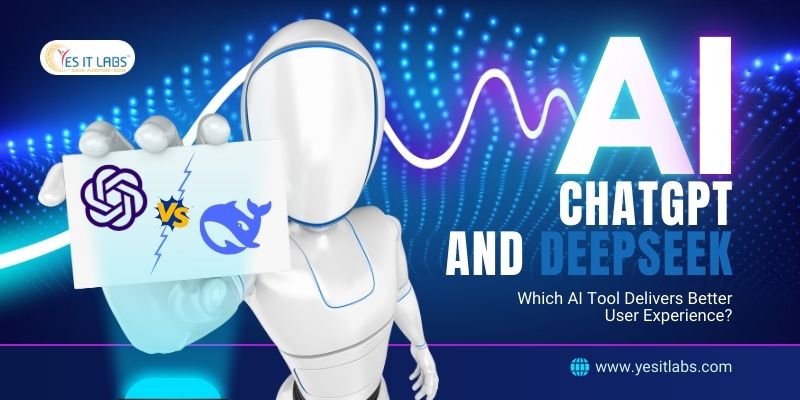
 By Hanna Tucker
By Hanna Tucker Future Trends in Offshore Software Development: What to Expect in the Coming Years
Offshore software development has become a vital strategy for businesses worldwide, offering cost-effective and innovative solutions. As technology rapidly evolves, several trends are reshaping the offshore software development landscape. For US companies, staying ahead of these trends is crucial for maintaining a competitive edge and making the most out of their offshore partnerships. Let’s explore the future and how these trends could impact your business.
Artificial Intelligence and Machine Learning Are Taking Over
Artificial Intelligence (AI) and Machine Learning (ML) are no longer just buzzwords; they’re revolutionizing the way software is developed. These technologies are making software smarter, more efficient, and more intuitive.
What’s Happening:
- Automated Code Generation: AI tools are getting better at writing and optimizing code, which speeds up development and reduces errors.
- Predictive Analytics: ML algorithms are helping software predict user behavior, automate tasks, and provide insights that were previously hard to come by.
Why It Matters:
- Boosted Efficiency: AI can handle repetitive tasks, allowing your developers to focus on more complex challenges.
- Enhanced User Experience: AI-driven applications can offer personalized experiences and smarter interactions, leading to happier users.
Looking Ahead:
- Ethical AI: As AI becomes more embedded in our daily lives, ensuring it’s used ethically and transparently will become increasingly important.
- Integration Challenges: While AI can bring numerous benefits, integrating it with existing systems might require careful planning to avoid disruptions.
In the realm of offshore software development, AI and ML are set to transform how teams across the globe collaborate and innovate, making these technologies a cornerstone of the future of software development services.
Cloud-Native Development Is Here to Stay
Cloud-native development is changing how software is designed, built, and deployed. By leveraging cloud environments, businesses are achieving greater flexibility and efficiency.
What’s Happening:
- Microservices Architecture: This approach breaks down applications into small, independent services that can be developed and updated separately, making it easier to scale and maintain.
- Serverless Computing: Serverless platforms allow developers to deploy applications without managing servers, which can simplify operations and cut costs.
Why It Matters:
- Scalability: Cloud-native applications can scale up or down easily based on demand, which is perfect for businesses with changing needs.
- Cost Efficiency: By using serverless and microservices, you can optimize infrastructure costs and improve your return on investment.
Looking Ahead:
- Vendor Lock-In: Be cautious about becoming too reliant on a single cloud provider, as this can limit your flexibility and increase costs.
- Security Challenges: As cloud environments grow more complex, robust security measures will be essential to protect your data.
For companies utilizing offshore software development, cloud-native technologies enable seamless integration and scalability, ensuring that global teams can deliver high-quality results efficiently.
Cybersecurity Is More Crucial Than Ever
With the rise in cyber threats, cybersecurity is a top priority. Offshore software development teams are adopting advanced security practices to safeguard data and ensure compliance.
What’s Happening:
- Zero Trust Architecture: This model assumes that threats could come from anywhere and continuously verifies the security of users and devices.
- Automated Security Testing: New tools automatically scan for vulnerabilities during development, helping to catch issues early.
Why It Matters:
- Better Protection: Strong cybersecurity practices help protect against breaches and data loss, which is vital for maintaining trust and meeting regulatory requirements.
- Regulatory Compliance: Adopting robust security measures helps you comply with various regulations, avoiding legal risks and fines.
Looking Ahead:
- Evolving Threats: As cyber threats continue to evolve, staying updated on the latest security trends and technologies will be crucial.
- Incident Response: Having a solid incident response plan will help you address and mitigate security breaches quickly and effectively.
In offshore software development, ensuring strong cybersecurity measures is essential for protecting sensitive data and maintaining trust across global teams.
Remote Work and Global Talent Pools Are Expanding

Remote work is here to stay, and it’s opening up new possibilities for offshore software development. Teams are now spread across various locations, providing access to a global talent pool.
What’s Happening:
- Distributed Teams: Offshore teams are more geographically dispersed than ever, allowing you to tap into a diverse range of skills and expertise.
- Collaboration Tools: Advanced tools are making remote work smoother, enhancing communication and productivity among distributed teams.
Why It Matters:
- Access to Talent: You can find skilled developers from around the world, which can drive innovation and help you tackle complex projects.
- Cost Savings: Remote work can reduce overhead costs related to office space and resources, giving you more flexibility with your budget.
Looking Ahead:
- Cultural Differences: Managing a diverse team requires understanding and sensitivity to different cultures, which can enhance collaboration and minimize conflicts.
- Work-Life Balance: Supporting remote workers involves providing the right resources and support to help them maintain a healthy work-life balance.
By leveraging a global talent pool through offshore software development companies, businesses can access a broader range of skills and innovations, which can significantly enhance their software development service offerings.
DevOps and Agile Practices are Becoming More Common
Agile and DevOps methodologies are becoming standard practice in offshore software development, emphasizing flexibility and continuous improvement.
What’s Happening:
- Agile Development: Agile practices like Scrum and Kanban focus on iterative progress and regular feedback, allowing teams to adapt quickly and deliver value incrementally.
- DevOps Integration: Combining development and operations into a cohesive unit facilitates continuous integration and delivery, making software development and deployment more efficient.
Why It Matters:
- Faster Time-to-Market: Agile and DevOps practices help you release updates and new features more quickly, keeping you competitive in a fast-moving market.
- Improved Collaboration: Enhanced collaboration between development and operations leads to better-quality software and more successful projects.
Looking Ahead:
- Tooling and Automation: Investing in the right tools and automation processes will help you get the most out of Agile and DevOps practices.
- Skill Development: Ensuring your team is skilled in these methodologies is essential for successful implementation and ongoing improvement.
For offshore software development companies, embracing Agile and DevOps practices means achieving greater efficiency and delivering high-quality results in less time.
User Experience (UX) and Design Are More Important Than Ever

User experience continues to be a major factor in software development. Offshore software development teams are putting more focus on creating engaging and user-friendly interfaces.
What’s Happening:
- UX Research: Investing in understanding user needs and preferences leads to designs that are more effective and user-centered.
- Design Systems: Consistent design systems help create a unified experience across platforms and devices, which strengthens brand identity.
Why It Matters:
- Higher User Engagement: A strong focus on UX can lead to better user retention and satisfaction, which is crucial for the success of your applications.
- Brand Consistency: A cohesive design system ensures that users have a consistent experience, which helps maintain your brand’s identity.
Looking Ahead:
- Personalization: Users expect personalized experiences, and incorporating these features can further enhance satisfaction and engagement.
- Accessibility: Making sure your applications are accessible to everyone, including those with disabilities, is important for inclusivity and compliance.
Incorporating advanced UX practices in offshore software development ensures that applications are user-friendly and meet the highest standards of design and functionality.
Blockchain Technology Is Gaining Momentum
Blockchain technology is becoming more prevalent in offshore software development, offering benefits like security and transparency.
What’s Happening:
- Smart Contracts: These self-executing contracts automate and enforce agreements without intermediaries, which can streamline processes and reduce disputes.
- Decentralized Applications (dApps): dApps operate on decentralized networks, providing greater security and trust for users.
Why It Matters:
- Increased Security: Blockchain’s decentralized nature enhances data security and reduces the risk of tampering.
- Enhanced Transparency: An immutable ledger ensures transparency in transactions and processes, which can build trust with users and stakeholders.
Looking Ahead:
- Scalability: Addressing scalability issues will be crucial as blockchain technology evolves and transaction volumes grow.
- Regulatory Landscape: Keeping up with the changing regulatory environment for blockchain will be important for ensuring compliance and avoiding legal complications.
For offshore software development companies, leveraging blockchain technology can offer enhanced security and transparency in software solutions, aligning with the latest industry standards.
Internet of Things (IoT) Technologies Are on the Rise
The Internet of Things (IoT) is revolutionizing how devices connect and interact, creating new opportunities for software development services.
What’s Happening:
- Smart Devices: Development is booming for smart devices like home automation systems and wearables, driven by consumer demand for connected technology.
- IoT Platforms: Platforms that manage and analyze IoT data are becoming more advanced, enabling more sophisticated applications.
Why It Matters:
- Innovative Products: IoT technologies can lead to new and innovative products that enhance user experiences and create a competitive edge.
- Data Insights: IoT platforms provide valuable data that can help you make better decisions and discover new business opportunities.
Looking Ahead:
- Interoperability: Ensuring that IoT devices and platforms work together seamlessly is crucial for providing a smooth user experience.
- Privacy and Security: Addressing privacy and security concerns is essential for protecting user data and maintaining trust.
Incorporating IoT technologies in offshore software development can open up new avenues for innovation and efficiency, driving growth and improving user experiences.
Conclusion
The future of offshore software development is bright, with advancements in AI, cloud-native technologies, cybersecurity, remote work, Agile and DevOps practices, UX design, blockchain, and IoT shaping the landscape. Embracing these trends will help you stay competitive and make the most out of your software development service partnerships. By understanding and adapting to these changes, you can leverage the strengths of offshore software development companies to drive innovation and achieve your business goals.
Tags: AI and ML, Android App Development, app development for companies, Custom Software Development, hire ios app developer, hybrid apps development, mobile application development, mobile software development company, offshore software development, software custom development, software development company, software development serviceLatest Resources
ChatGPT and DeepSeek: Which AI Tool Delivers Better User Experience?
January 29, 2025
Top Frameworks for Cross-Platform App Development in 2025
January 22, 2025
A Guide to Types of Artificial Intelligence (AI)
January 14, 2025
Key Benefits of React Native App Development
January 7, 2025
Leveraging AI in Startup Software Development: Trends and Tips
December 30, 2024











 Services
Services

